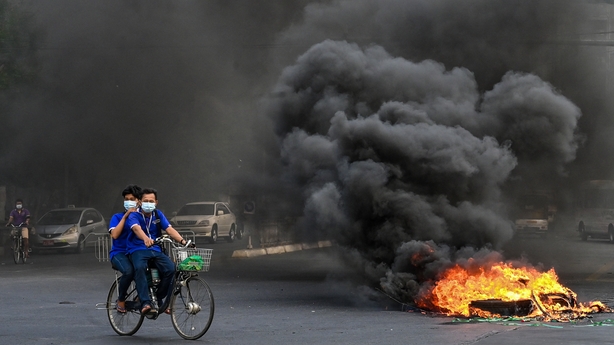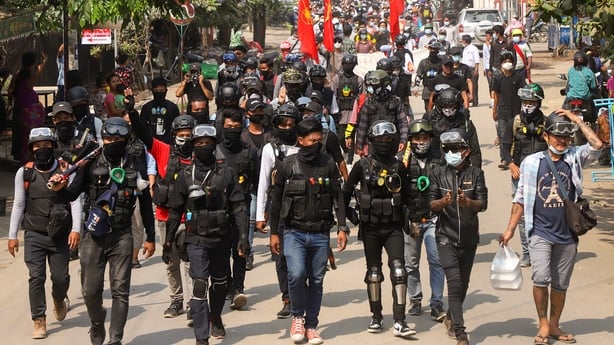Demonstrators in Myanmar held protests demanding the restoration of Aung San Suu Kyi's government and called for more coordinated nationwide dissent against the military junta, as regional nations prepared for talks on the crisis.
Six people were killed at the weekend, according to activists, as police and soldiers forcefully broke up demonstrations that some protesters are calling a "spring revolution".
At least 564 people, including 47 children, have been killed by security forces during protests against the 1 February coup, an activist group has said.
The movement has included street marches, a civil disobedience campaign of strikes and quirky acts of rebellion organised on social media.
Activists called for a nationwide clap later today, in appreciation of those ethnic minority armed groups that have are supporting the democratic cause, and young demonstrators who have been at the vanguard of protests, trying to shield or rescue people wounded by security forces.
Besides the brutal crackdown on street protests, the junta has sought to suppress the campaign by shutting down broadband and mobile data services.

Brunei, the chair of the Association of Southeast Asian Nations (ASEAN) countries, threw its support behind a regional leaders' meeting to discuss developments in Myanmar and said it has asked officials to prepare for a meeting of the ten-nation bloc in Jakarta.
Following talks between Malaysian Prime Minister Muhyiddin Yassin and Brunei Sultan Hassanal Bolkiah, Brunei said both countries have asked their ministers and senior officials to undertake "necessary preparations for the meeting that will beheld at the ASEAN Secretariat in Jakarta, Indonesia".
No date was given.
ASEAN operates by consensus but the divergent views of its members on how to respond to the Myanmar army's use of lethal force against civilians and the group's policy of non-interference has limited its ability to act.
Malaysia, Indonesia, the Philippines and Singapore have all expressed alarm over the killings of demonstrators and support an urgent high-level meeting on Myanmar.
Besides Brunei, the other members include Myanmar itself, Thailand, Laos, Vietnam and Cambodia.
A total of 2,667 people have been detained under the junta, the Association for Political Prisoners (AAPP) activist group said.

The junta at the weekend announced arrest warrants for about 60 celebrities, social media influencers, models and musicians on charges of incitement.
Australian couple released from house arrest in Myanmar
An Australian couple was released from house arrest in Myanmar and allowed to leave the country.
Business consultants Matthew O'Kane and Christa Avery, a dual Canadian-Australian citizen, tried to leave the country on a relief flight in late March but were barred from departing and placed under house arrest.
"I am of course incredibly relieved to have been released and to be on my way home with my husband Matt," Ms Avery said in a statement.
"Even though I knew that I had done nothing wrong it was very stressful being held under house arrest for two weeks, not knowing what was going to be the outcome of the questioning."
The couple said they were incredibly sad to leave Myanmar, which was their home for eight years, and hope the country stabilises soon.
A spokesperson for Canberra's foreign affairs department said Australian diplomats had "provided support for their departure from Yangon on 4 April".
The couple ran a bespoke consultancy business in Yangon.
A third Australian, economist Sean Turnell, was arrested a week after the coup and remains in custody.
The university professor and advisor to Ms Suu Kyi was the first foreign national arrested following the coup.
He has been charged with a violation of state secret laws, along with Ms Suu Kyi late last month.

